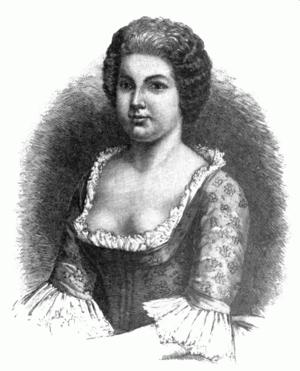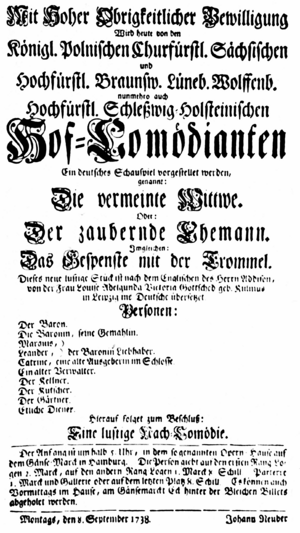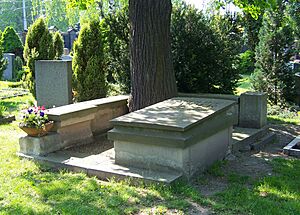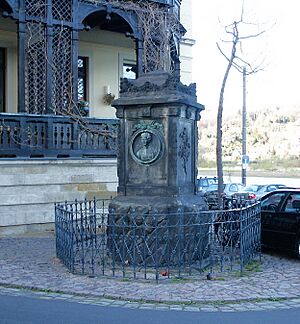Friederike Caroline Neuber facts for kids
Quick facts for kids
Friederike Caroline Neuber
|
|
|---|---|

A posthumous (1898) depiction of Neuber
|
|
| Born |
Friederike Caroline Weissenborn
9 March 1697 Reichenbach im Vogtland, Electorate of Saxony, Holy Roman Empire
|
| Died | 30 November 1760 (aged 63) near Dresden, Electorate of Saxony, Holy Roman Empire
|
| Resting place | Leubener Cemetery in Dresden |
| Occupation | Actress, theatre Director, actor-manager |
| Years active | 1718–1748 |
| Spouse(s) | Johann Neuber |
Friederike Caroline Neuber, also known as Die Neuberin, was a famous German actress and theatre director. She is known as one of the most important figures in German theatre history. She helped create modern German theatre.
Neuber also worked hard to make acting a more respected job. She taught actors to perform in a more natural way. At a time when most theatre managers were men, Caroline Neuber became a very successful woman in theatre. For 25 years, she changed German theatre. She helped raise its status alongside other important male theatre leaders of her time. These included her husband Johann Neuber, Johann Müller, Johann Schönemann, Gotthold Ephraim Lessing, and Johann Christoph Gottsched.
Contents
Life and Work
Early Life
Friederike Caroline Weissenborn was born on March 9, 1697. Her birthplace was Reichenbach im Vogtland. Her father, Daniel Weissenborn, was a court inspector. Her mother, Anna Rosine Weissenborn, was very educated. Caroline learned reading, writing, and French from her mother.
Caroline had a difficult childhood. She lived with her father in Zwickau from 1702 to 1717. When she was 20, in 1717, Caroline ran away from home. She left with Johann Neuber, who worked for her father. They married one year later in 1718. The Neubers learned about theatre by working with other traveling groups. They performed with Christian Spiegelberg from 1717 to 1722. Then they joined Karl Caspar Haack from 1722 to 1725.
The Neuber Theatre Troupe
In 1727, Caroline and her husband started their own acting troupe. This group became a training place for many future great actor-managers. In the same year, their company received a special permission. Frederick Augustus I, the elector of Saxony, allowed them to perform. They could perform at the Leipzig Easter Fair.
The troupe performed in many towns and cities. They traveled to places like Warsaw, Kiel, and Strasburg. They often performed in Dresden, Hamburg, and Leipzig. We don't have a full list of all their plays. But we know about eight months in 1735. During this time, they performed 75 "Schauspiele" (a mix of tragedies and comedies). They did 203 performances of these plays. They also performed 93 "Nachspiele" (short plays) 107 times. The Neuber troupe helped train actors like Heinrich Koch and Friedrich Schönemann. These actors later started their own successful theatre groups.
Working with J.C. Gottsched
By 1725, Neuber's acting style caught the eye of Johann Christoph Gottsched. He was a critic and theatre reformer. Gottsched based his ideas on classic French plays. Caroline worked closely with Gottsched and his wife, Luise Gottsched. Together, they aimed to improve German theatre. Gottsched was the first person to call her "Die Neuberin."
Gottsched helped the Neuber company a lot. He made them learn their parts carefully and rehearse. Before this, German stages often had mostly improvised comedies. The partnership between Caroline Neuber and Johann Gottsched lasted until 1739. Many people see this time as a turning point in German theatre. It marked the beginning of modern German acting.
Removing Harlekin from the Stage
In 1736, Neuber came to Frankfurt. She wanted to perform serious theatre. The Neuber company performed major dramas based on classical plays. They avoided the crude topics often found in popular theatre. This included the character Harlekin. This showed that theatre in Frankfurt was starting to change. Neuber's performances were more respectable than the popular Harlekin shows. But it was hard to change what most audiences wanted to see.
In 1737, Neuber famously removed Hanswurst from the stage. Hanswurst was a popular clown character. This act was part of her effort to make German theatre more respected. This event is seen as a symbol in German theatre history. It marked a shift from popular, improvised plays to more modern, written theatre. Hanswurst plays were often made for male audiences. During this time, it became more acceptable for women to be actresses. However, it was still unusual for women to manage theatre companies. Later historians often described Caroline Neuber as having a "masculine spirit." This was to explain how she achieved so much in a role usually held by men. Neuber died near Dresden when she was 63.
Working with Lessing
Caroline Neuber is credited with discovering the playwright Gotthold Ephraim Lessing. Many historians consider Lessing to be the first dramaturg. After meeting Caroline, Lessing became more interested in theatre. He translated several French plays for her. In 1748, Neuber produced his first play, The Young Scholar.
Legacy
Caroline Neuber (Play)
Caroline Neuber is a play about Caroline Neuber's life. It was written by Eberhard Keindorff and Gunther Weisenborn. The play was created for actress Agnes Straub. Caroline Neuber first opened in 1935 in The Third Reich. At this time, the government controlled the arts.
The play was allowed to be published in 1934 and performed in 1935. It was unusual for its time because it seemed to question some of the ideas of the Third Reich. By then, Caroline Neuber was seen as an important theatre reformer. The play allowed audiences to compare Neuber's reforms to the Nazi-controlled theatre. This helped people to quietly criticize Nazi theatre. However, those in power saw the play simply as a story about a famous actor and reformer. They thought it supported their own theatre reforms. For the general audience, Die Neuberin was a story about a star. For others, it showed how past theatre reforms could relate to the present. Caroline Neuber's legacy helped Germans learn from the past and think about their present.
Caroline Neuber Prize
This award celebrates Neuber's important contributions to German theatre. Since 1998, the city of Leipzig gives out the Caroline Neuber Prize. It is awarded every two years in March, on her birthday. The prize is worth €6,000. It goes to a female theatre artist from a German-speaking country. The artist must have set new standards for excellence in theatre. Past winners include Monika Gintersdorfer, Jutta Hoffmann, Inge Keller, Konstanze Lauterbach, Nele Hertling, Karin Henkel, Sasha Waltz, and Ann-Elisabeth Wolff.
 | John T. Biggers |
 | Thomas Blackshear |
 | Mark Bradford |
 | Beverly Buchanan |




